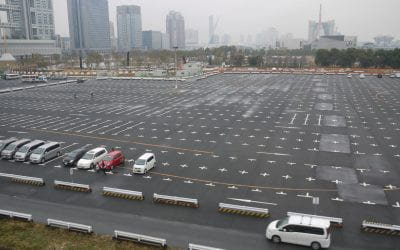Pace Environmental Law Review
Donate to PELR
Symposium
Writing Competition
GreenLaw – Latest Articles
How Parking Infrastructure Presents a Resilient Climate Opportunity
In urban environments, parking infrastructure has become so ubiquitous that it often fades into the backdrop of our daily lives. Yet its omnipresence masks a deeper environmental dilemma. These vast expanses displace ecosystems and shrink biodiversity, and are...
Building Climate Resilience: Introduction to a Framework for Policymakers
Our world is in the midst of an unprecedented environmental crisis, marked by the escalating frequency and intensity of extreme weather events, rising sea levels, and shifting precipitation patterns. This dire situation underscores the critical importance of Climate...
The Parking Problem: Why Cities Overbuilt Parking Spaces
The Institute of Transportation Engineers (ITE) was founded in 1930 with the goal “to improve mobility and safety for all transportation system users and help build smart and livable communities.” The idea behind the ITE was to help developers with roadway design,...
Climate Resilient Development at the Local Level: Minneapolis Reduces Greenhouse Gas Emissions and Dependency on Private-Vehicle Use by Eliminating Parking Minimums
What is Minneapolis 2040? In March 2018, the City of Minneapolis began public meetings to discuss its plan for future growth. Over the course of two years, residents participated in sharing their hopes for the city. It was determined that as the city grows, everyone...
Climate Resilient Development at the Local Level: Addressing Embodied Carbon Through Low Carbon Building Regulations
One of the oldest industries on the planet, human construction has evolved over thousands of years. From the first stone roadways in Mesopotamia, to towering New York City skyscrapers, mankind continually innovates new ways to construct the built world around us....
Flooding, the Comprehensive Plan, and Climate Change Resilience
Flooding events are widespread and catastrophic. According to the Federal Emergency Management Agency (FEMA), 99% of counties in the United States experienced a flood between 1996 and 2019. Anthropogenic climate change is increasing the intensity and frequency of...
How the Indo-Pacific Economic Framework for Prosperity May Help Seaports Prepare for Climate Change
Climate change is a looming threat that includes rising sea levels, unpredictable storms, and the destruction of seaports.[1] Island nations are at risk of economic collapse since they rely on ports for almost all their trade.[2] When Hurricane Dorian struck the...
Climate Resilient Development at the Local Level: Santa Fe’s Midtown Local Innovation Corridor
Santa Fe’s Midtown Local Innovation Corridor (Midtown LINC) draws on the city’s land use authority through City of Santa Fe, New Mexico Ordinance 2016-39 and City of Santa Fe, New Mexico Ordinance 2019-19. These ordinances specify permitted and prohibited uses,...
Climate Resilient Development at the Local Level: Santa Fe’s Integrated Approach to Mitigate Wildfire Risk
The City of Santa Fe, New Mexico, is in the foothills of the Sangre de Cristo Mountains. This region contains “frequent-fire forest types,” which the state manages following the New Mexico Forest Restoration Principles. A team of industry professionals developed these...
Climate Resilient Development at the Local Level: Certifying Cities for Achieving Low Impact Development
In this report, low impact development (LID) refers to any land use strategy that promotes the retention or addition of vegetation on or around land development that mitigates and adapts to climate change. LID is often pigeonholed as a stormwater management technique;...




